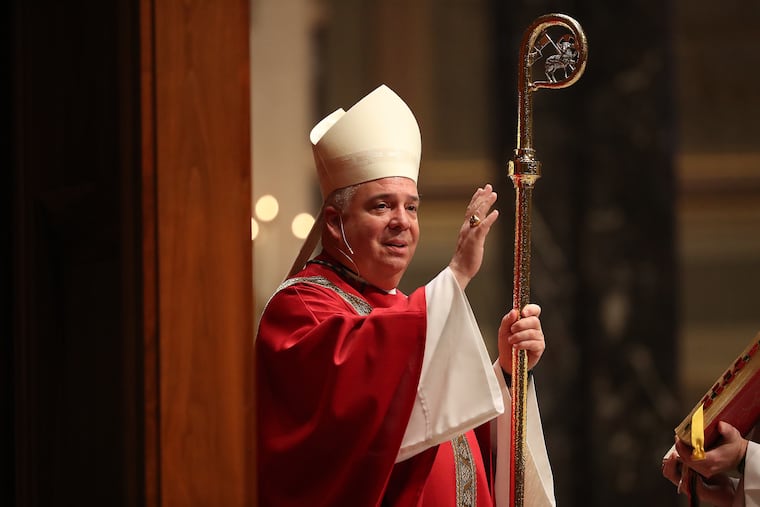Archbishop Pérez talks ministering Philadelphia through a pandemic: ‘Easter couldn’t have come at a better time’
Archbishop Nelson J. Pérez, while discussing Holy Week, says that the archdiocese is ready for the worst to come with the coronavirus pandemic.

Like so many of us, Archbishop Nelson J. Pérez had plans. What’s been postponed for him aren’t just the meetings you’d expect, but the dozens of visits he had scheduled as he began his new role as the head of the Archdiocese of Philadelphia and its more than one million parishioners.
Pérez, whose installation Mass was in mid-February, was only weeks into his post leading the archdiocese when the coronavirus forced him to release area Catholics from the obligation of attending Mass in person. On his one-month anniversary, he suspended all public Masses. This spring, he was going to visit local Catholic schools; he was going to visit all of the archdiocese’s deaneries, or regional divisions; he was going to sit down with various civic organizations.
“Back in February, I started out that way, visiting parishes. I visited Little Flower — that was awesome,” Pérez said. “I spent 20 years of my priesthood in that area of North Philadelphia. Then I come back, and we’re all ready to go, and things are on the schedule, and then the plug got pulled out from under it.”
Pérez and the archdiocese have been forced to go remote because of the pandemic.
Hours ahead of the Mass of the Lord’s Supper, the archbishop said that this year, the livestreamed Mass would be a simplified version.
He praised doctors and other health-care workers for not only their work, but their compassion during this crisis.
"In so many ways, it’s the mystery of that wonderful gesture of Jesus, who washed the feet of his disciples the night before he died, which will be the gospel that is proclaimed at this evening’s Mass,” Pérez said on what Catholics call Holy Thursday. “The washing of the feet might not be happening ritually this year in our churches, but it is happening in real time, all over the place in neighborhoods and community centers and social services.”
The archbishop’s typical day has transformed into Zoom meetings and conference calls, he said, with constant discussions concerning the coronavirus and its impact. Aside from prayer, in the free time that he has, Pérez has been turning to music. He’ll put on performers like Christian hip-hop artist TobyMac and Christian pop duo For King & Country. He will play along to easy listening music on his guitar. He sees the current timing — Holy Week occurring during a pandemic — as an opportunity.
“Easter couldn’t have come at a better time for all of us,” Pérez said. “What is Christianity about? At the end, in a nutshell, is that we believe that a dead man rose from the dead and came back to life, and in doing that gave us the gift of eternity.… Even when everything appears to be done, faith and God comes in and says, ‘Wait a minute. Don’t be so sure.’ Easter just speaks powerfully of the power of hope, even in the midst of despair.”
The questions that the archdiocese has been receiving from the faithful, he said, have been “natural”: When can we go to church again? Are we going to be OK?
"And my answer is, of course we’ll be OK,” Pérez said. “You know, sometimes I think we take things for granted, and that was something that was so readily available to us — to have the opportunity and the option to just go to church with not being questioned by anybody, and gather. This time is a time where maybe we need to reevaluate our own appreciation of that great gift that we have here in this country, which is our religious liberty.”
The 58-year-old prelate said he would not “cast judgment” upon churches that may still be welcoming worshipers physically, but emphasized that suspension of public services was the archdiocese’s doing its “part to protect each other.”
He said that with it being so early in the data collection process, he’s not sure what to think of racial disparities in COVID-19 cases, but he wants to see those in need, no matter what their background, receive the same treatment.
“We have to make sure that everybody is treated equally, because we all possess the same dignity,” said Pérez. “This crisis, this coronavirus — it doesn’t discriminate.... So our care cannot discriminate either.”
Nearly eight years ago, the archbishop narrowly survived an accident on the Long Island Expressway. There are things that he learned in his recovery that he’s tapping into now. One, everything can’t be controlled; two, everything passes; three, he didn’t heal alone, but with the help of other people.
Projections show that Philadelphia will begin to reach its peak death toll from the coronavirus next week. The region has not yet seen the worst, but Pérez says the archdiocese is ready.
“We work every day at it, at all sorts of different levels,” the archbishop said. “Our Catholic Social Services is in the front lines of all these things in terms of their ministry and service to people.”
He said Catholics should trust that the doors of their churches will reopen. For everyone regardless of faith, Pérez said, now is a moment where everyone needs to be kind to one another.
“This is a time for us to be compassionate and loving and caring to the people that are next to us, that God has placed by our side, and in particular those who are vulnerable,” he said. “Those who are poor, or the elderly that might feel isolated. A call, a smile, a wave, even from a distance is a powerful way of expressing our common humanity, because we are all in the same boat here.”